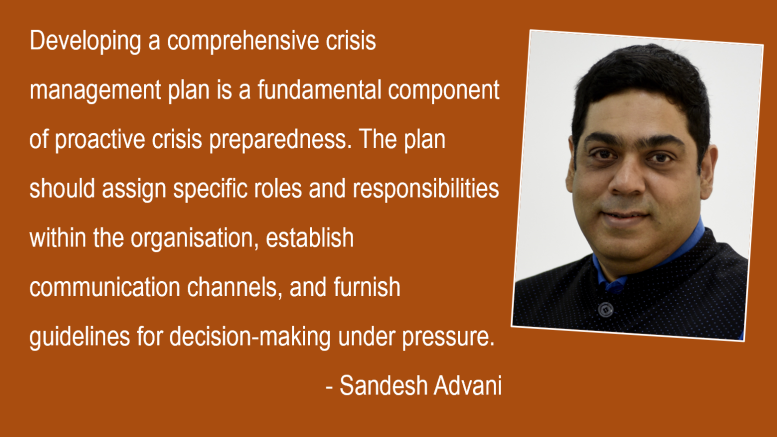In today’s dynamic and interconnected world, businesses and organisations face a constant array of potential crises that could jeopardise their standing and survival. Adeptly navigating these crises, be it a product recall, social media backlash, data breach, or personnel scandal, is vital for upholding reputation and maintaining stakeholder trust.
Merely reacting to crises as they occur is no longer enough. Organisations must embrace a proactive approach to crisis preparedness in an era of rapid information dissemination and unyielding public scrutiny. This proactive stance encompasses crafting robust crisis management plans and cultivating a culture that emphasises transparency, accountability, and continuous enhancement.
At the core of proactive crisis preparedness is acknowledging that crises are not a matter of “if” but “when.” Recognising this reality permits organisations to allocate resources and attention to predict potential crises, evaluate vulnerabilities, and devise strategies to mitigate risks before they escalate into full-blown emergencies.
Developing a comprehensive crisis management plan is a fundamental component of proactive crisis preparedness. This plan should delineate explicit protocols and procedures for identifying, evaluating, and responding to crises. It should assign specific roles and responsibilities within the organisation, establish communication channels, and furnish guidelines for decision-making under pressure.
Moreover, a proactive crisis management plan should remain fluid and adaptable to evolving circumstances. Regular review and updates ensure its relevance and effectiveness in addressing emergent threats and challenges.
In addition to a well-defined crisis management plan, organisations must invest in crisis simulation exercises and training programs. These simulations enable teams to rehearse their response strategies in a controlled setting, pinpoint areas for improvement, and bolster confidence in their ability to handle crises effectively.
Furthermore, proactive crisis preparedness extends beyond the organisation itself. It involves actively monitoring and engaging with stakeholders, including customers, employees, investors, regulators, and the media. By maintaining open lines of communication and cultivating relationships grounded in trust and transparency, organisations can better manage perceptions and mitigate reputational damage during times of crisis.
Another critical aspect of proactive crisis preparedness is integrating technology and data analytics. Leveraging advanced tools and platforms for monitoring social media, news coverage, and online sentiment empowers organisations to detect early warning signs of potential crises and respond promptly before they escalate. Similarly, data analytics can offer valuable insights into the root causes of crises, enabling organisations to address underlying issues and forestall future occurrences.
Moreover, proactive crisis preparedness fosters a culture of accountability and ethical conduct throughout the organisation. Leaders must set an example, demonstrating integrity, honesty, and a commitment to doing the right thing even in adversity. By nurturing a culture that prizes transparency and ethical behaviour, organisations can fortify resilience and trust among stakeholders, thereby minimising the impact of crises on their reputations.
Ultimately, proactive crisis preparedness is not merely about managing crises when they occur but about averting them from happening in the first place. By investing in risk assessment, crisis planning, stakeholder engagement, and ethical leadership, organisations can navigate through turbulent times with resilience and integrity.
In conclusion, crisis preparedness is imperative for organisations in today’s volatile and uncertain environment. By embracing a proactive approach to addressing PR challenges, organisations can mitigate the impact of crises on their reputation and emerge stronger and more resilient in their aftermath. Through investing in comprehensive crisis management plans, training programs, technology, and a culture of transparency and ethical conduct, organisations can effectively mitigate risks, build stakeholder trust, and safeguard their reputation in the long term.
The views and opinions published here belong to the author and do not necessarily reflect the views and opinions of the publisher.



Be the first to comment on "Crisis Preparedness: Implementing a Proactive Strategy for Addressing PR Challenges"